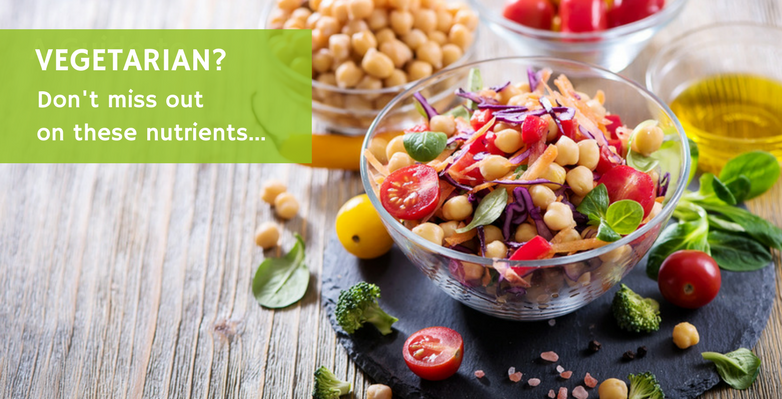You have no items in your shopping cart.
0item(s)
You have no items in your shopping cart.

Vegetarian? Don't miss out on these Nutrients...
Meat is full of nutrients and if you choose not to eat it you need to get these nutrients from other sources. Here are some of the nutrients you should pay extra attention to if you have a vegetarian diet…
VITAMIN B12
A deficiency in vitamin B12 is one of the most common deficiencies in vegetarians. Vitamin B12 has a number of functions including:
• Contributing to the reduction of tiredness and fatigue
• Contributing to the normal function of the immune system and nervous system.
• Aiding normal red blood cell formation.
Given it’s involvement in these body processes it is important that a vitamin B12 deficiency is avoided. The best way to increase your vitamin B12 intake whilst sticking to a vegetarian diet is to eat:
• Milk, Yoghurt and cheese (If you’re not vegan)
• Cereals
• Soya milk
• or take a supplement
PROTEIN
Protein is an extremely important part of the diet as it is a component of every cell within the body. It is required for many processes within the body including the growth and repair of muscles and the production of enzymes.
The building blocks of protein are known as amino acids and there are 22 all together, 9 of which are essential as they cannot be produced by the body. Eggs and dairy products contain all 9 of the essential amino acids and are therefore referred to as ‘complete protein sources’. However for those vegetarians who don’t eat these foods there are a small number of plant based ‘complete protein sources’ such as quinoa, soya and hemp. Other vegetarian protein sources contain some of the essential amino acids but not the full complement, therefore it is best to consume a range of these different sources to ensure you’re getting them all. The best vegetarian protein sources include:
• Eggs
• Milk and Dairy Products (If you’re not vegan)
• Nuts and nut butters (almond and peanut butter).
• Seeds.
• Beans, lentils, chickpeas.
• Soya products – tofu.
• Protein powders – pea, hemp.
IRON
Iron is used by the body to make red blood cells which transport oxygen around the body and is also required for energy production. A lack of iron can cause tiredness and fatigue and deficiency can lead to anaemia. For non-vegetarians the best source of iron is red meat as not only does it have a high iron content it is easily absorbed by the body. Vegetarian sources of Iron include:
• Green leafy vegetables – Spinach
• Beans & Lentils
• Nuts
• Fortified Cereals
• Grains – Quinoa and Oats
Although these foods are good sources of iron, the iron content isn’t as easily absorbed as it is from meat sources. However, consuming vitamin C with a meal can help you to absorb more iron from plant sources. This could mean eating foods with high vitamin c contents with your meal such as broccoli or even just having a glass of orange juice.
VITAMIN D
It is well known that vitamin D contributes to the maintenance of healthy bones, teeth and muscles. What is less well known is its importance in supporting the immune system, with some recent research suggesting it may help prevent colds and flu. Sunlight is the best source of vitamin D which is why it is commonly known as the 'sunshine vitamin' however in areas where there is a lack of sun exposure such as the UK it is important to get more vitamin D from the diet. The majority of food sources are suitable for vegetarians including:
• Eggs (If you’re not vegan)
• Fortified yoghurts and desserts (If you’re not vegan)
• Fortified cereals
• Mushrooms
Whilst these foods contain vitamin D it is only in small amounts and therefore taking a supplement is a good option. Public Health England (PHE) recently recommended that everyone in the UK should take a vitamin D supplement especially during the winter months when there is very little sun exposure.